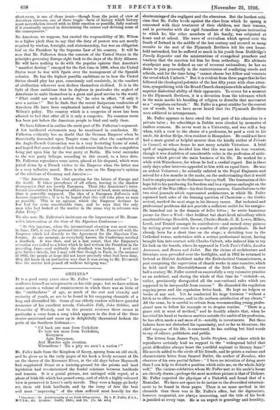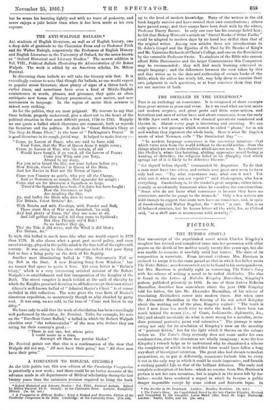OMNIANA.*
IT is a good many years since Mr. Fuller " commenced author " ; he confesses himself an octogenarian on his title-page; but we have seldom come across a volume of reminiscences in which there was so little of the " crabbedness " of age, so much of the zest and vivacity and curiosity of youth, as are to be found in his easygoing chronicle of a long and diversified life. Some of our elderly readers will have grateful memories of his excellent novels, Culmshire Folk, John Orlebar, and Chronicles of Westerly, and to the present reviewer there recurs in particular a verse from a, song which appears in the first of the three stories mentioned and sums up in delightfully thrasonical fashion the pride of the Southern Irishman:—
"I'd back one man from Corkshire To bate ten more from Yorkshire, Kerrymen Agin Derrymen, And Munster agin creation.
Wirrasthrue I 'Tis a pity we aren't a nation ! "
Mr. Fuller hails from the Kingdom of Kerry, sprung from an old stock, and he gives us in the early pages of his book a lively account of life on the shores of the Kenmare River, in the old days before Maynooth had supplanted Douai as a training-ground for the priests and land legislation had revolutionized the feudal relations between landlords and tenants. It is a genial picture, not untinged with regret, of a phase of Irish life which has passed away, and of which a highly coloured view is preserved in Lever's early novels. They were a happy-go-lucky set, these old Irish landlords, and by the irony of fate the best and most " improving " of the class suffered most heavily for the • Onutiana : the Autobiography of an Irish alogenarian. By J. F. Fuller, F.S.A., de. London : Smith, Elder, and Co. [Ts. Cele net.] shortcomings of the negligent and the.absentees. But the hardest criti- cism that Mr. Fuller levels against the class from which he sprang is concerned with their treatment of their children, not their tenants, and in particular with the rigid formalism of the religious instruction to which he, like other members of his family, was subjected at home and at school. The wave of revivalism which spread. over the South of Ireland in the middle of the last century and secured so many recruits to the sect of the Plymouth Brethren left his own house- hold untouched, but he suffered so much in his youth from Doddridge's Family Expositor and the ministrations of evangelical preachers and teachers that the reaction led him far from orthodoxy. His ultimate standpoint may be defined as one of reverent rationalism; he has no desire to join personally in the controversies of conflicting creeds and schools, and for the time being " cannot choose but follow and venerate the creed which I inherit." But it is evident from these pages that he has followed the theological polemics of the last fifty years with close atten- tion, sympathizing with the Broad Church championswhile admitting the superior dialectical ability of their opponents. To revert for a moment to the Plymouth Brethren, it is a deviation from the tolerance which in the main marks his handling of religion to describe that movement as a " crapulous outbreak." Mr. Fuller is a great stickler for the cornet use of words, but we have never heard that the Plymouth Brethren were addicted to intemperance.
Mr. Fuller appears to have owed the best part of his education to a private tutor ; his schooldays in Dublin were clouded by memories of endless sermons. He never went to a University, and was still a boy when, with a view to the choice of a profession, he paid a visit to his uncle, Sir Arthur Helps, then resident in Hampshire. He could not have had a more genial or helpful mentor than the kindly author of Friends in Council, at whose house he met many notable Victorians. A brief spell of engineering decided him that this was not his true vocation, though it was doubtless of considerable value in the profession of archi- tecture which proved the main business of his life. He worked for a while with Waterhouse, for whom he had a cordial regard. But in these early days ether interests appealed to him with an equal force. He wan an ardent Volunteer ; he actually enlisted in the Royal Engineers and served for a few months in the ranks, on the understanding that it would lead to employment on the Ordnance Survey Staff. The frustration of this hope led to his purchasing his freedom and to a vigorous onslaught on the methods of the War Office—his first literary success. Contributions to the two rival journals which represented architecture, in which Mr. Fuller espoused both sides of the burning question of Classicism v. the Gothic revival, marked the next stage in his literary career. But technical and professional problems did not provide a sufficient outlet for his energies. He launched out in the domain of belles lettres ; he wrote humorous poems for Once a Week—that brilliant but short-lived miscellany which numbered George Meredith, Resent, Charles Reade, G. H. Lewes, Millais, Leech, and Tenniel amongst its contributors—and earned stray guineas by writing prose and verse for a number of other periodicals. He had already been for a short time on the stage; a sketching tour to the Cathedral towns, undertaken with a serious professional intent, having brought him into contact with Charles Calvert, who induced him to try his luck on the boards, where he appeared in Uncle Tom's Cabin, London Assurance, and Romeo and Juliet. But the claims of architecture and literature soon prevailed over the footlights, and in 1802 he returned to Ireland as District Architect under the Ecclesiastical Commissioners, a post comprising the supervision of church works in nine counties, which he held until the Disestablishment of the Irish Church. For over half a century Mr. Fuller carried on successfully a very extensive practice as an architect, and during the whole of that time he " violated—or, rather, persistently disregarded all the conventional rules which are supposed to be inseparable from success." He discarded the regulation copying-press and the regulation letter-book. He kept no ledgers or books of any sort. Yet he conducted his large business " without a hitch as to office routine, and to the uniform satisfaction of my clients." All the same, he is careful to refrain from recommending young profes- sional men to follow his example or to despise routine. " There is a grave risk in want of method," and he frankly admits that, when ho has tried his hand at business matters outside the ambit of his profession, he has often made a sad mess of it—notably in investments. But these failures have not disturbed his equanimity, and so -far as literature, the chief rdpep'yov of his life, is concerned, he has nothing but kind words to say of editors, publishers, and public.
The letters from James Payn, Leslie Stephen, and others which he reproduces certainly lend no support to the " widespread belief that great difficulties always beset the youthful aspirant to literary fame." His novels added to the circle of his friends, and he prints a curious and characteristic letter from Samuel Butler, the author of Erewhon, who observes of his own partial failure : " I have no intention of doing more than I can help to disturb a position which suits me, on the whole, fairly well." The various celebrities whom Mr. Fuller meet at his uncle's house are cleverly drawn ; perhaps the most mordant picture is that of Dickens. Mr. Fuller expected the physique of a Pickwick and found that of a Mantalini. We have not space to do justice to the diversified entertain- ment to be found in these pages. There is no more method in the chronicle than there was in Me. Fuller's office, but the digressions, however tangential, are always interesting, and the title of his book is justified at every tups. He is an expert in genealogy and heraldry,
but he wears his learning lightly and with no trace of pedantry, and never enjoys a joke better than when it has been made at his own expense.



































 Previous page
Previous page